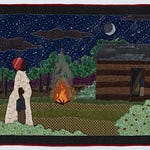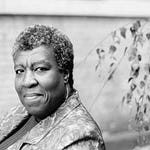Transcript
[00:00:00] Jasmyne Gilbert: Hi, my name is Jasmyne. And you're listening to “between starshine and clay.” The title of this platform pays honor to the inimitable Lucille Clifton, who reminds me that the best is yet to come. It's been a minute, right? This is the first recitation I've shared since like September?
[00:00:20] Maybe October? I don't know. Anyway, time is fake. It's moving so quickly and yet so cyclically. So here we are. Before we get started, would you please consider sharing “between starshine and clay” with your loved ones? I'm trying to reach 250 subscribers by the end of 2024, and I can only do so with your help.
[00:00:39] We're so close. We are so close. I think we can do it, but I really need your help to achieve that goal. So today I'm reading from the essay that I published on November 6th, 2024, titled, “Belief as Blueprint: Myth, Imagination, and Social Change.” It reads.
[00:01:00] It feels quite strange to be sending out a newsletter this week.
[00:01:05] Like we woke up in a twisted neoliberal time loop and I feel very disoriented. But I'm not here to talk about the national election for the sake of my own sanity. I do, however, want to talk about belief and the failure of imagination in our country - factors on full display right now. I'm very curious about how what we believe impacts how we move in the world.
[00:01:31] My approach to mythological studies, because it is a multivalent field, is the study of us and how our spiritual beliefs have shaped cultural systems throughout history. Most often, this means looking at the psychological, spiritual, political, and social legacies of myth and religion. This approach informs my academic research and what I share here on Substack.
[00:01:54] You can even see it in the Art Heaux Chronicles, since most of the art I end up engaging with explores the same themes within Black art specifically. I'm interested in learning how we can change culture intentionally instead of in reactionary ways. And I think a good place to start making those changes is within our imagination by looking at what we believe and how that informs our daily lives and the ways we collectively build society.
[00:02:20] Last week, I read the Frameworks Institute's most recent State of American Culture report. You know what the first key finding was? According to their research, through a series of focus groups and surveys, quote, Americans are deeply dissatisfied with the state of our country and think things should change, but aren't sure what that change should look like, end quote.
[00:02:45] Ain't that some shit? We want to change the world we live in, but are having a really hard time coming up with ideas about how to do so. And so, you know, I nearly jumped out of my seat when I saw that key finding and how closely related it was to my graduate research, because that helps me know, tapping into the cultural zeitgeist, right?
[00:03:05] And I'm not just studying weird stuff out in the forest in central California. It felt, it was a really interesting synchronicity that I don't know. I felt really seen by it. Anyway, so overall, there were seven key findings in the report today. I want to highlight three skills related to those key findings that we must cultivate if we want to transform our culture.
[00:03:28] Broadly, they're thinking systemically about our issues, engaging our radical imagination and taking organized action toward what we envision. All right. So one, we must cultivate a broader ability to help people see how systems influence daily life. Systemic thinking refers to the understanding that the lives of individuals are shaped by our broader culture.
[00:03:55] The previous Frameworks Institute cultural report showed that respondents thought more systemically about cultural issues in 2020, a mindset that began to plateau about two years later and then dipped in 2023. And if you recall, 2020 is when , people were globally acknowledging that COVID was a thing.
[00:04:15] A lot of places in the U. S. began to shut down then that summer, there were a couple racial uprisings, what people have, pejoratively or not called the Great Racial Awakening. So there were a lot of things happening in that time that people begin to think more broadly about systems. And then as the world began to reopen in 2023, it started to shift and that mindset dipped.
[00:04:37] And so now what we see more of is individualistic thinking, and that's a mindset that believes the outcomes of people's daily lives are due to their choices. And this mental model is growing among young people, especially ages 18 to 29, regarding public health and race. Again, returning to the previous point, the world opened back up, people weren't stuck inside seeing Black folks get killed and we had sort of collectively decided to stop masking and just pretending that COVID didn't exist.
[00:05:08] So a quote, taken together, these results suggest that younger people are re-entrenching in mindsets that justify the status quo and existing power relations and that blame individuals for the problems they face. In short, everything that's wrong in your life is your problem and your fault. So my approach to mythological studies leans towards systemic thinking and dissects how the constructs of the society have direct daily impacts on the people who live in them.
[00:05:35] Once we learn to see the web of social constructs we live in, it then becomes easier to address those we want to change, rather than sort of being snatched back and forth with the pendulum of reactionary responses to shifts in the culture.
[00:05:49] Skill two, imagination is the fuel for radical action. On the one hand, people really want a different world, but struggle to think of futures that will satisfy them. However, even if they did find solutions, they believe the government would undermine them.
[00:06:09] Per the Frameworks Institute, quote, We see people deeply unhappy with the status quo, often because they see our society as rigged by the powerful few against the many, end quote. This quote from adrienne maree brown in Emergent Strategy sums it up best to me.
[00:06:27] We are in an imagination battle. Imagination gives us borders, gives us superiority, gives us race as an indicator of ability. I often feel I am trapped inside someone else's capability. I often feel I am trapped inside someone else's imagination and I must engage my own imagination in order to break free.
[00:06:48] My approach to mythological studies is inspired by brown, as well as Octavia Butler, Mariame Kaba, Lucille Clifton, and others.
[00:06:57] For me, it has been a tool for sharpening my creativity, building courage and practicing hope. Studying the ways that individuals and relatively small groups of people have transformed history in every age encourages me to do the work necessary to fight for our lives. By returning to that sweet spot of myth and imagination, in other words, my research interests, every week, I draw from a well of generativity and nourishment that does not allow me to succumb to despair and nihilism.
[00:07:25] At least not for long. Like, high key, I am prone to despair and nihilism, and this research niche that I'm trying to carve out is what keeps me in the fight. Just the other day, seriously. I was sitting on the ground, just like, I got overwhelmed by the news. I was sitting on the ground, like, sobbing, and my beloved husband was like, are you okay?
[00:07:47] Are you hurt? No, I mean, my heart is hurt. Anyway, whatever. All right, skill three. No one is coming to save us. Frameworks Institute research participants believed that a charismatic leader could bring the changes they want. Quote, even when asked to imagine what a better future might look like, solutions are hard to come by, hoping that perhaps technology or charismatic leaders could help us overcome our divisions as a society and make life better.
[00:08:17] End quote. This is the most troubling, and perhaps depressing of the key findings from the Frameworks Institute and I hate to break it to you, honey, but no one is coming to save us. Anyone who promises to deliver sweeping fixes to our individual and collective problems is dangerous and untrustworthy.
[00:08:36] Let me, let me run that back because I don't, based on the last election. I don't think y'all understand that anyone who promises to deliver sweeping fixes to our individual and collective problems is dangerous and untrustworthy. What's that line from Ghost? You in danger, girl. We are in danger! Anyway, nearly all the great mythic traditions of the world emerged as responses to change or in resistance to a social or material reality that they're adherents wanted to defy Myth shows me that we have the power to radically remake ourselves and our world, but we have to do it. No one else will or should do it for us. It takes organized collective action to shift the status quo. I have some ideas about how we can do this, all informed by my graduate research and 10 years of experience facilitating innovative social transformation efforts.
[00:09:36] I'm really looking forward to sharing that information very soon because it's almost ready just a few weeks out, so make sure you're on the list to receive the announcement when it's ready.
[00:09:46] That concludes the recitation of “Belief as Blueprint”. Visit the Frameworks Institute Instagram for a quick summary of the research findings from The State of American Culture 2023-2024 and you can read the full report on their website. I'm grateful for the support and attention you've given to my creative practice and I will be doubly grateful if you shared this dispatch with your loved ones so we can reach 250 subscribers by the end of 2024.
[00:10:16] If you're feeling abundant and have spare funds to support my public study and research practice on cultural mythology, please consider signing up for a paid subscription to “between starshine and clay” at only $8 a month. Thank you for listening today. Enjoy the rest of your week. I look forward to being back in your inbox very soon.












Share this post